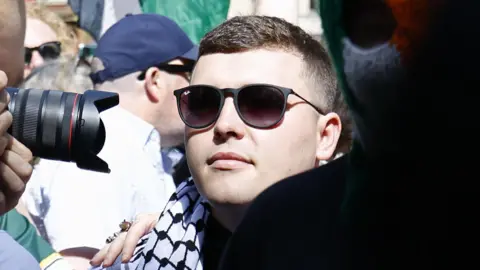Liam Óg Ó hAnnaidh, an Irish rapper better known by his stage name Mo Chara, has recently garnered attention after being granted unconditional bail following his appearance in London’s Westminster Magistrates’ Court. Ó hAnnaidh is one of the members of the Irish hip-hop group Kneecap, famous for their use of the Irish language and their controversial lyrics. The rapper was charged with a serious accusation, specifically regarding the display of a flag associated with Hezbollah, a group that has been proscribed under UK law. This incident occurred during a performance in London, leading to his subsequent arrest.
On June 18, 2025, as Ó hAnnaidh left the courtroom, he was met with overwhelming support from fans and associates who applauded his release outside the court. This reaction underlines the loyalty of his followers and suggests that they view the charges as an infringement on both his artistic expression and free speech. The 27-year-old artist was accompanied by fellow band members Móglaí Bap, known offstage as Naoise Ó Cairealláin, and DJ Próvaí, whose real name is JJ Ó Dochartaigh, demonstrating a united front from the group.
Ó hAnnaidh’s next court appearance is scheduled for August 20, where he is required to return for further proceedings. The Chief Magistrate emphasized the necessity of his attendance at this upcoming session, acknowledging the gravity of the situation. In a social media statement released in May, the band firmly denied the charge, asserting their intention to “vehemently defend” themselves against what they characterized as an unjust offense.
During the court session, Kneecap’s supporters gathered outside, proudly wearing “Free Mo Chara” T-shirts and holding placards emblazoned with messages such as “Defend Kneecap” and “Free Palestine.” This vocal show of support hints at a broader political context, as the band has often intertwined cultural themes of Irish identity with political statements. Their approach to music serves as a commentary on issues that resonate deeply within Northern Ireland and beyond, highlighting the ongoing tensions surrounding identity and language.
One particular placard caught the eye of many observers—it displayed the phrase “More Blacks, More Dogs, More Irish, Mo Chara,” a twist on a historically discriminatory slogan used in boarding houses across the UK in the mid-twentieth century. Such quotes in the band’s work serve as intentional provocations aimed at stirring dialogue on race and identity.
Kneecap, formed in 2017, has risen rapidly in the music scene, captivating audiences with their unique blend of hip-hop and Irish language, making waves far beyond their local roots. They have even inspired a semi-fictionalized film featuring accomplished actor Michael Fassbender and won recognition at prestigious awards like the British Academy Film Awards (BAFTA).
However, the group has also faced criticism, particularly for their outspoken stance on political issues. For example, earlier this year at Coachella, they faced backlash when they displayed messages regarding the ongoing war in Gaza during one of their performances. Additionally, they recently won a legal battle concerning the withdrawal of an arts grant by the UK government, allowing them to continue their artistic endeavors without governmental interference.
Ultimately, as Ó hAnnaidh awaits his next court appearance, the conversations sparked by his case highlight the intersection of art, politics, and identity in contemporary society. Kneecap’s music not only entertains but also challenges societal norms, and the support seen rallying outside Westminster court is a testament to their impact on cultural discourse. The public response suggests that many continue to view the case through a lens of free speech, standing firmly against any implication that art should be stifled by governmental constraints. Whether the coming court sessions will alter the course of Kneecap’s journey remains to be seen, but it will undoubtedly have repercussions for similar artists navigating the complex landscape of expression and activism.



